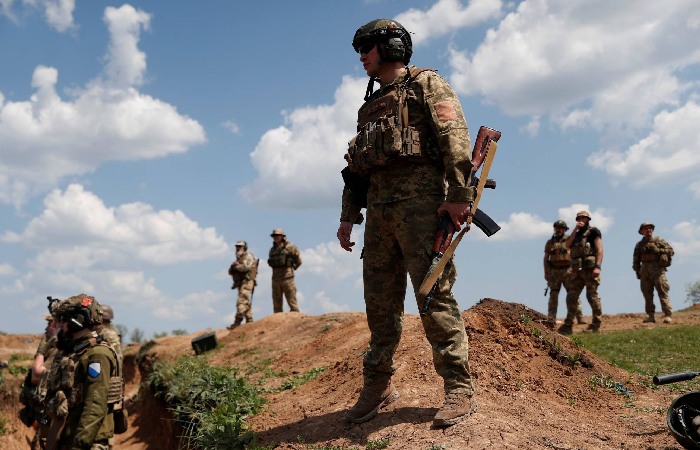Table of Contents
Introduction

The Ukraine Offensive has been a significant event in recent history, marked by intense military operations and political tensions. This essay aims to provide an in-depth analysis of the Ukraine Offensive, examining its causes, key players, consequences, and potential implications for regional stability. Focusing on the period following my knowledge cutoff in September 2021, this essay will shed light on the events leading up to and during the Ukraine Offensive.
Historical Background
It is essential to examine the historical context to understand the Ukraine Offensive. Ukraine, a country with a complex history, has long been caught in a power struggle between Russia and Western interests. The dissolution of the Soviet Union in 1991 led to Ukraine’s independence, but the country’s geopolitical significance remained a leading factor in regional dynamics.
Causes of the Ukraine Offensive
The causes of the Ukraine Offensive are multifaceted. Tensions escalated following Ukraine’s shift towards closer ties with the European Union (EU) and the subsequent protests in 2013-2014, known as the Euromaidan movement. Russia’s takeover of Crimea in 2014 and the ongoing conflict in Eastern Ukraine further strained relations between Russia and Ukraine, leading to a protracted stalemate.
Key Players
The Ukraine Offensive involves multiple key players. Ukraine’s government, led by President Volodymyr Zelensky, seeks to maintain territorial integrity and strengthen ties with Western allies. Under President Vladimir Putin, Russia aims to exert influence in its near abroad and protect its strategic interests in the region. The European Union, NATO, and the United States also play significant roles as Ukraine’s supporters and partners.
Military Operations
The Ukraine Offensive witnessed a series of military operations and strategic maneuvers. The conflict has showcased conventional and unconventional warfare tactics, from the initial incursions and seizure of critical locations in Eastern Ukraine to the subsequent counteroffensives by Ukrainian forces. Cyber warfare, information warfare, and propaganda have also played crucial roles in shaping the narrative and influencing public opinion.
Humanitarian Consequences
The Ukraine Offensive has had severe humanitarian consequences. The conflict has resulted in civilian casualties, displacement, and a humanitarian crisis. Infrastructure damage, economic disruptions, and the loss of livelihoods have further exacerbated the suffering of the Ukrainian population, particularly in the affected regions.
International Response
The global community has responded to the Ukraine Offensive with varying degrees of involvement. The European Union and the United States have imposed economic sanctions on Russia to pressure it to de-escalate the conflict. NATO has a more significant regional presence, conducting military exercises and supporting Ukraine. Diplomatic efforts, including negotiations and peace talks, have been pursued to find a peaceful resolution.
Implications for Regional Stability
The Ukraine Offensive has far-reaching implications for regional stability. The conflict has strained relations between Russia and the West, raising concerns about a new Cold War-era division. The ongoing military operations and the potential involvement of external actors further complicate the situation, making a peaceful resolution increasingly challenging. The conflict also has broader implications for international law, territorial integrity, and the balance of power in Eastern Europe.
Proxy Warfare and Foreign Involvement
The Ukraine Offensive has been characterized by proxy warfare, with various foreign actors supporting different sides of the conflict. Russia has been accused of providing military support to separatist groups in Eastern Ukraine, including supplying weapons and troops. On the other hand, Ukraine has received assistance from Western countries, including military training, equipment, and financial aid. The involvement of foreign actors has heightened the intensity of the conflict and raised concerns about the potential for further escalation.
Energy Security and Geopolitical Interests
The Ukraine Offensive has significant implications for energy security and geopolitics. Ukraine is a crucial transit route for Russian natural gas supplies to Europe. The conflict has underscored the vulnerability of energy infrastructure and highlighted the potential for disruptions in energy supplies, impacting both Ukraine and European countries heavily reliant on Russian gas. Moreover, the conflict has also fueled discussions about diversifying energy sources and reducing dependence on Russian energy exports.
Disinformation and Hybrid Warfare
Disinformation and hybrid warfare tactics have been prominent in the Ukraine Offensive. Russia and Ukraine have utilized propaganda, social media manipulation, and disinformation campaigns to shape public opinion and advance their respective narratives. These tactics have added complexity to the conflict, blurring the lines between truth and misinformation and exacerbating societal divisions.
Diplomatic Efforts and Peace Initiatives
Despite the military operations, diplomatic efforts and peace initiatives have been pursued to find a resolution to the Ukraine Offensive. The Normandy Format, which includes representatives from Ukraine, Russia, Germany, and France, has facilitated negotiations. The Minsk contracts, signed in 2014 and 2015, outline a roadmap for a peaceful settlement, but the implementation has faced significant challenges. The ongoing diplomatic efforts highlight the importance of dialogue and negotiation in resolving the conflict.
Humanitarian Assistance and Reconstruction
Humanitarian assistance and reconstruction efforts are crucial in addressing the aftermath of the Ukraine Offensive. International organizations, such as the United Nations and non-governmental organizations, have provided aid to affected populations, including food, shelter, and medical assistance. Additionally, infrastructure reconstruction and the restoration of basic services are essential to support the recovery and stability of the affected regions.
Conclusion
The Ukraine Offensive has emerged as a complex and volatile conflict with profound regional stability and international relations implications. As the battle continues to evolve, it is crucial for all parties involved to prioritize diplomatic solutions, de-escalation, and the protection of human rights. The international community must remain engaged and committed to finding a peaceful resolution that respects Ukraine’s sovereignty and ensures the well-being of its people.
